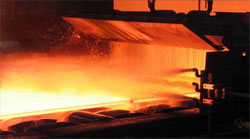New intensive-cooling unit allows production of high-strength steels in a wide range of thicknesses

Example of a Siemens VAI cooling unit in a hot-strip rolling mill<br>
Siemens VAI Metals Technologies will install a new intensive-cooling unit in the Hot-Strip Mill 2 of ThyssenKrupp Steel AG in Duisburg-Beeckerwerth, Germany. The “Power Cooling” process will enable high- and highest-strength steels to be reliably cooled for a wide range of strip thicknesses. This will enable additional steel types to be efficiently produced with a high degree of precision. The intensive cooling unit is scheduled to commence operation in December 2010.
The intensity of cooling and volume flow in the cooling section must be carefully regulated so that the desired microstructure of the rolled material is achieved with high precision. Contrary to laminar-flow strip-cooling processes, “Power Cooling” technology developed by Siemens VAI allows cooling rates as high as 400 K/s. In particular, the production of high- and highest-strength steels in the upper thickness range of up to one inch requires high cooling rates. Another special feature of the cooling section is the wide range within which the flow volume can be regulated. This enables the strip-cooling process to be precisely and flexibly controlled.
“Power Cooling” can achieve heat flow densities of up to 5 MW/m2 – three times higher than the rates achieved with laminar-flow cooling processes. The new cooling system also allows lower flow volumes to be set for a quasi-laminar cooling condition.
A newly developed cross-plant temperature model will also be utilized for the operation of this plant. This model applies a uniform calculation method for the entire finishing mill, through the cooling section and to the coiler. This enables a highly accurate prediction of the start of the phase transition, even if it takes place in the finishing mill. Furthermore, the calculation of the bainitic portions of the structure is also integrated within the model.
The cross-plant temperature model replaces the existing Siemens laminar-flow strip-cooling temperature model, which has been used in the Beeckerwerth Hot-Strip Mill 2 since 2007. It helps the phase transitions to be controlled even more precisely during the cooling of hot-rolled steel strip, thereby increases the flexibility of the rolling mill. Different types of steel can be produced in any sequence, and new types of steel can be added to the production without having to change the software or model parameters.
ThyssenKrupp Steel Europe AG is the leading company for the European carbon-steel activities of the ThyssenKrupp Group, one of the world's largest producers of quality flat-steel. The Hot Strip Mill 2 in Duisburg-Beeckerwerth rolls six million tons of steel per annum, which is one of the highest mill outputs in the world. A rolling modernization program enables ThyssenKrupp Steel Europe to produce a numerous types of modern, high-quality steels for use in the automotive industry and for pipe production.
Further information about solutions for steel works, rolling mills and processing lines can be found at: http://www.siemens.com/metals
The Siemens Industry Sector (Erlangen, Germany) is the worldwide leading supplier of environmentally friendly production, transportation, building and lighting technologies. With integrated automation technologies and comprehensive industry-specific solutions, Siemens increases the productivity, efficiency and flexibility of its customers in the fields of industry and infrastructure. The Sector consists of six divisions: Building Technologies, Drive Technologies, Industry Automation, Industry Solutions, Mobility und Osram. With around 207,000 employees worldwide (September 30), Siemens Industry achieved in fiscal year 2009 total sales of approximately €35 billion. http://www.siemens.com/industry
The Siemens Industry Solutions Division (Erlangen, Germany) is one of the world's leading solution and service providers for industrial and infrastructure facilities comprising the business activities of Siemens VAI Metals Technologies, Water Technologies and Industrial Technologies. Activities include engineering and installation, operation and service for the entire life cycle. A wide-ranging portfolio of environmental solutions helps industrial companies to use energy, water and equipment efficiently, reduce emissions and comply with environmental guidelines. With around 31,000 employees worldwide (September 30), Siemens Industry Solutions posted sales of €6.8 billion in fiscal year 2009.
Media Contact
All latest news from the category: Machine Engineering
Machine engineering is one of Germany’s key industries. The importance of this segment has led to the creation of new university degree programs in fields such as production and logistics, process engineering, vehicle/automotive engineering, production engineering and aerospace engineering among others.
innovations-report offers informative reports and articles covering technologies such as automation, motion, power train, energy, conveyor, plastics, lightweight construction, logistics/warehousing, measurement systems, machine tools and control engineering.
Newest articles

Innovative 3D printed scaffolds offer new hope for bone healing
Researchers at the Institute for Bioengineering of Catalonia have developed novel 3D printed PLA-CaP scaffolds that promote blood vessel formation, ensuring better healing and regeneration of bone tissue. Bone is…

The surprising role of gut infection in Alzheimer’s disease
ASU- and Banner Alzheimer’s Institute-led study implicates link between a common virus and the disease, which travels from the gut to the brain and may be a target for antiviral…

Molecular gardening: New enzymes discovered for protein modification pruning
How deubiquitinases USP53 and USP54 cleave long polyubiquitin chains and how the former is linked to liver disease in children. Deubiquitinases (DUBs) are enzymes used by cells to trim protein…



